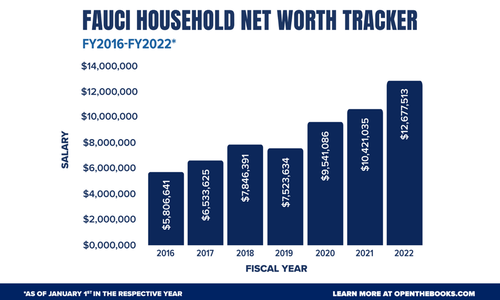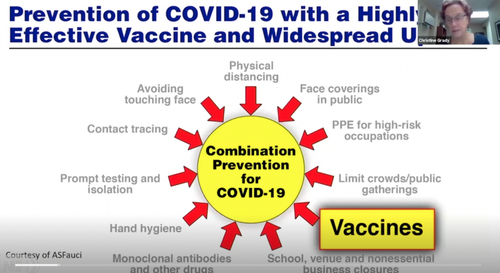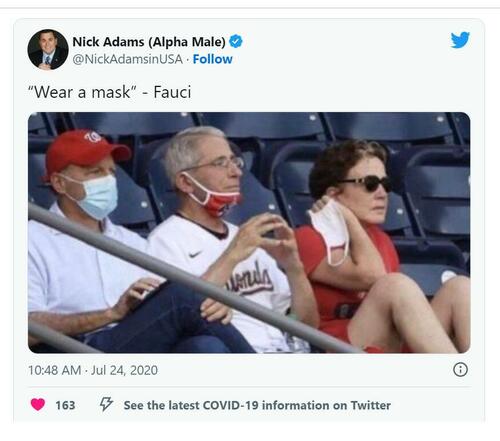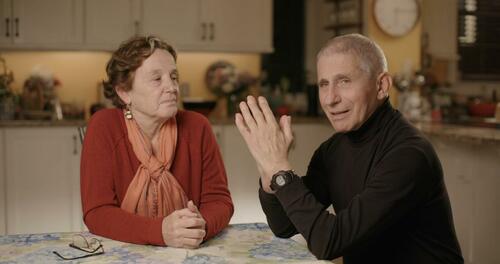How Fauci's Wife Used NIH Position To Backstop Her Husband’s Pandemic Health Directives
Authored by Adam Andrzejewski via OpenTheBooks,
It's the Washington, D.C. power couple that cost taxpayers nearly $1 million per year.
While Dr. Anthony Fauci gave the nation its pandemic public policy prescriptions, his wife, Dr. Christine Grady, the Chief Bioethicist at Fauci’s employer, the National Institutes of Health (NIH) provided the moral framework.
The Faucis are important to the center-left, because they represent the pinnacle moment of the administrative state – top-down public policy run by an elite group of government scientists.
Conversely, to the center-right, the Faucis represent “the fatal conceit of the elites.” As Noble Laureate economist Friedrich Hayek theorized, the elites are no match for billions of free people acting in their own best interests.
MEET THE FAUCIS
While Tony Fauci was the top paid federal bureaucrat and out-earned the U.S. President at $480,654 per year, Christine Grady, as the chief bioethicist at NIH out-earned the U.S. Vice President ($243,749). When adding 35-percent in benefits, the couple cost taxpayers an estimated nearly $1 million per year.

It’s difficult to know where Anthony Fauci ends and Christine Grady begins. Here’s how Tony Fauci described Grady’s influence on his public policy decisions:
“I've benefited greatly from this partnership of overlapping interest and common interest. So, a lot of the things that I do with regard to the development of vaccines, the development of therapies, being involved with outbreaks and pandemics, have ethical overtones to them. I can say that I am very blessed to be living with someone who is very likely, most people think, one of the most outstanding ethicists in the world. To have her in the house -- you know, as a consultant on ethical issues—is pretty advantageous.”
So, the Faucis lived a conflict of interest at the breakfast table, the office, and back home around the dinner table. However, NIH has never acknowledged this.
In fact, NIH forced our organization to file two federal lawsuits with the public-interest law firm Judicial Watch as our lawyers to finally bring transparency to the Fauci/Grady job descriptions, conflict of interest documents, financial and ethics disclosures, contracts, and other documents.
Then, NIH slow-walked thousands of pages of production. Yet, no nepotism waivers were produced, no acknowledgement of conflicting interests, and no records documenting violations of federal ethics policy.

While Grady’s work during the pandemic was described as “invaluable” by then-NIH director Francis Collins, the general public knows little about her day-to-day responsibilities.
An open records request for Grady’s job description reveals she, too, is meant to use her position to influence policy.

Advocating Lockdowns
Dr. Fauci knew that his “draconian policies” on social isolation and economic lockdowns would have “collateral negative consequences,” and admitted Christine Grady was a driving force behind his hardline approach.
In a November 2021 interview with the couple, Fauci said that he gained strength from his wife’s support saying, “background and her experience in really core ethical principles [helped] me to really feel much more comfortable in what I was saying.”
In the interview, Christine Grady described how she mind-mapped national policy with her husband:
"But we've had conversations about the sort of consequences of telling people to stay home and what it would do for the economy. And there were a lot of people in those days that, and still who said, it's ruining the economy. It's much more important to just keep things going and not worry about transmitting virus…I said, that one of the messages should be, how many lives are you willing to sacrifice? And that message would be pretty stark and pretty brutal, but that's really what the trade-off was…And so we've had that kind of conversation over dinner more than once, actually.”
Fauci replied that these conversations “sharpened [his] resolve” to move forward with lockdown policies.
Social isolation was one of the individual sacrifices Grady and Fauci thought were necessary to make on behalf of “public health.”
Vaccine Development & Public Safety
Like her husband, Grady exclusively focused her attention and remarks on vaccine development rather than other potential ways to treat and combat the spread of COVID-19.
One major paper she co-authored in 2020 advocated for vaccines to be distributed under emergency use authorization (EUA), which is how the federal government ultimately proceeded.
In this paper, Grady’s advocacy for vaccines came with a troubling acknowledgement:
“even with mandated safety monitoring after EUA distribution, it would be difficult or impossible to ascertain vaccine-induced adverse events.”
However, during most of her public presentations, she asserted that vaccines were developed in a fast, but “safe and rigorous” manner. Just one of many examples can be found here.
By November 2021, she said the risk of unknown long-term effects were “not zero” but that “there is a balance between benefiting the public health now versus waiting for all the information we might get.”
Despite these admissions, Grady often said she was “disturbed” by vaccine hesitancy, implying that safety concerns were somehow unreasonable.
Vaccine Mandates
Grady’s stance on vaccine mandates changed radically throughout the pandemic.
In June 2020, a presentation she gave suggested “immunity passports” could cause “discrimination without much overall gain.” A passport system would allow businesses to limit or deny access to those who remained unvaccinated.
Six months later, in January 2021, Grady said, “I do believe that healthcare providers, like everyone else, should have the choice” whether to take the vaccine or not.
But by early October 2021, Grady had decided the choice facing health care workers was a drastically different one: whether to get the vaccine or lose their jobs.
Later that month, she also flipped her position on vaccine passports. What once was a potential source of discrimination was recast as a way to access “social benefits” like restaurants and movie theaters.
It’s a disturbing way to describe Americans free association of movement.
Grady went on to co-author a March 2022 report approving of social ostracization for the vaccine-hesitant and encouraging employers to pressure their workers:
“While some employers might understandably feel hesitant to pressure employees to get vaccinated, our analysis suggests that it is often ethically acceptable to inform, encourage, strongly encourage, incentivize, and subtly pressure unvaccinated people to benefit them, the organization, and other employees.”
In fewer than two years, Grady had completely altered her assessment of vaccine mandates and widespread restrictions on the behavior of unvaccinated Americans. Gone were concerns about discrimination and freedom of choice.
As Dr. Fauci pushed and pressured the public to get vaccinated for the sake of their neighbors and family members, Grady began considering it ethical to fire workers who did not comply.
Likewise, it became a “social benefit” to get a vaccine passport that would allow people to avoid government restrictions on their free movements.

Mask Mandates
While her husband advocated masking and double masking—even when “fully vaccinated”—Dr. Grady consistently backed his position.
In July 2020, during an InStyle interview, Grady answered questions about masking:
Interviewer: Let me ask you, Chris, as a bioethicist, what do you make of this moment we're in, when even a mask has become more of a divisive issue?
Grady: Well, I would say that masks shouldn't be divisive. It's a relatively easy way to protect one's self and others. And so for public health reasons, I think everybody should do it. From an ethical perspective there is always this tension between what you ask people to do that feels like a restriction of their liberty and what is required for public health. And in this case, it seems like a slam dunk. It's not restricting liberty much, and it's very helpful for public health.
Grady was consistent and in November 2021 spoke to the ethical balancing test of public safety versus individual freedom and never viewed mask wearing to be much of an infringement on individual rights:
“There's a classic tension between public health, and individual interests and freedoms. Where there seems to be this conflict to the things that we do to protect the public health, and to protect the population for the common good. Sometimes they are perceived to be, and sometimes they do in small ways, infringe on people's freedoms. There are principles of public health ethics that help you sort out the kinds of interventions that we should use: Things that are effective, that are proportional, where the benefits outweigh the risks that are necessary, that are least infringement possible, that are transparent, that we can publicly justify.
…What's striking to me is that, the kinds of burdens that we've asked people to undertake, like putting on a mask, don't really infringe on one's freedoms very much. They're low burden and they have an effect. They do protect the person who's wearing the mask, as well as the people that are around them.”
A recent credible study on mask wearing during the pandemic argued there is no clear impact of masking on Covid-19 infection rates.
Patients Dying in Isolation
During the pandemic, Grady revealed a default preference for government control over individual rights and responsibilities. Grady was an early proponent of one of the most heinous pandemic polices: patients dying in isolation.
For example, while uncritically accepting dying in isolation as a fact of the pandemic, Grady’s primary solution was to expand funding for health care workers to have access to therapy and other resources to heal from their “moral distress.”
As early as April 2020 Grady said:
“Because of visiting policies and fear of contagion sometimes when somebody is really sick their family cannot visit them, they can't see them…the stress and the sadness and the isolation on families is and is going to be great.”
In a November 2020 NIH presentation she called these “lonely” deaths “understandable:”
"It’s a lonely kind of death, many institutions, understandably have visitor policies which either restrict the number of visitors to one or zero so sometimes people are dying without having their family nearby and that puts an additional burden on the healthcare staff.”
In one co-authored paper urging healthcare workers to “temper these potentially dehumanizing scenarios with imaginative solutions that do not sacrifice compassion and equal respect on the altars of safety and efficiency.”
She interrogates the tension between individual freedom and community safety in a book published April 26, 2022, as a co-author proposing a radical “solidarity model” for ethics in healthcare, stating that rather than emphasizing a respect for individuals to make decisions in their own interest:
“We should recognize that there are times when solidarity takes precedence over individual liberties, and broadening our concept of “respect for persons” means uniting as a profession to protect all those who expect to receive care from nurses in whatever healthcare setting they find themselves.”
She co-edited a section in the same book arguing this extends to dying in insolation:
“The solidarity model may apply to restricted family visitation, which generated moral distress for nurses, particularly when patients died without loved ones present…”
CONCLUSION – GRADY AND THE NEXT PANDEMIC
As demonstrated by her own words, Grady’s record evinces an understanding of ethics that begs fundamental moral questions, regularly subordinates individuals beneath an amorphous “public health,” and relies on subtle but unacknowledged shifts to retain an alleged moral high ground.
While some of her observations early in the pandemic did show an interest in providing nuance to policymaking—questioning the usefulness of immunity passports and highlighting issues with long-term vaccine effects under a EUA rollout—this quickly gave way to conformity to broader political zeitgeist, painting pushback as ignorant, uncaring, and simply wrong.
By 2021 her public statements never suggested a limit to sacrifices the individual should ethically make on behalf of “public health,” from masking, to taking vaccines, to foregoing family gatherings even at the point of one’s own death.
Both Fauci and Grady made clear that they wish for ethicists like Grady to have more power and more influence over political decision-making.
As Grady remains the chief NIH bioethicist, Americans should ponder: does Grady’s philosophy advance what is “fair” and “just” in public health policy? What does her continued leadership mean for the future of American policy.
Taxpayers compensate Grady generously, and they’re owed full transparency about her role, responsibilities and influence – during the pandemic and into the future.
Note: We reached out to Dr. Christine Grady and NIH for comment. While acknowledging our requests, no statement or comment was received before publication.
ADDITIONAL READING
Dr. Anthony Fauci: The Highest Paid Employee In The Entire U.S. Federal Government Published January 21, 2021 | Forbes
Dr. Anthony Fauci’s Little Known Biodefense Work. It’s How He Became The Highest Paid Federal Employee. Published October 20, 2021 | Forbes
No, Fauci’s Records Aren’t Available. Why Won’t NIH Immediately Release Them? Published January 12, 2022 | Forbes
Breaking: Fauci’s Net Worth Soared To $12.6 Million During The Pandemic – Up $5 Million (2019-2021). Published September 28, 2022 | OpenTheBooks.Substack.com
HISTORIC RELEASE: Dr. Anthony Fauci’s Official Work Calendar (November 2019 – March 2020) | Published October 20, 2022 | OpenTheBooks.Substack.com
ABOUT US
OpenTheBooks.com – We believe transparency is transformational. Using forensic auditing and open records, we hold government accountable.
In the years 2021 and 2022, we filed 100,000+ FOIA requests and successfully captured $19 trillion government expenditures: nearly all federal spending; 50 state checkbooks; and 25 million public employee salary and pension records from 50,000 public bodies across America.
Our works have been featured at the BBC, Good Morning America, ABC World News Tonight, The Wall Street Journal, USA Today, C-SPAN, Chicago Tribune, The New York Times, NBC News, FOX News, Forbes, National Public Radio (NPR), Sinclair Broadcast Group, & many others.
Our organization accepts no government funding and was founded by CEO Adam Andrzejewski. Our federal oversight work was cited twice in the President's Budget To Congress FY2021. Andrzejewski's presentation, The Depth of the Swamp, at the Hillsdale College National Leadership Seminar 2020 in Naples, Florida posted on YouTube received 3.8+ million views.
https://ift.tt/fZm68h3
from ZeroHedge News https://ift.tt/fZm68h3
via IFTTT





0 comments
Post a Comment